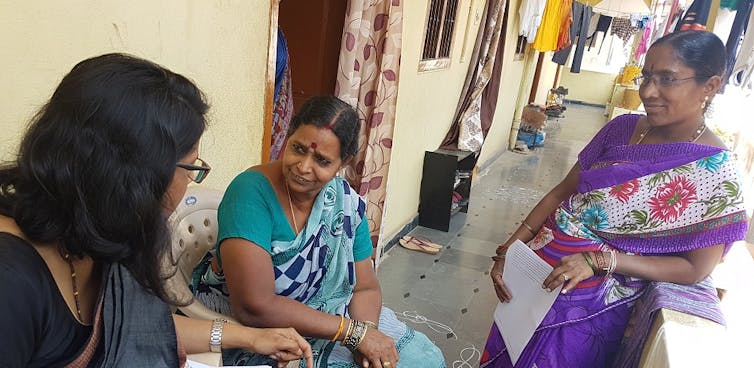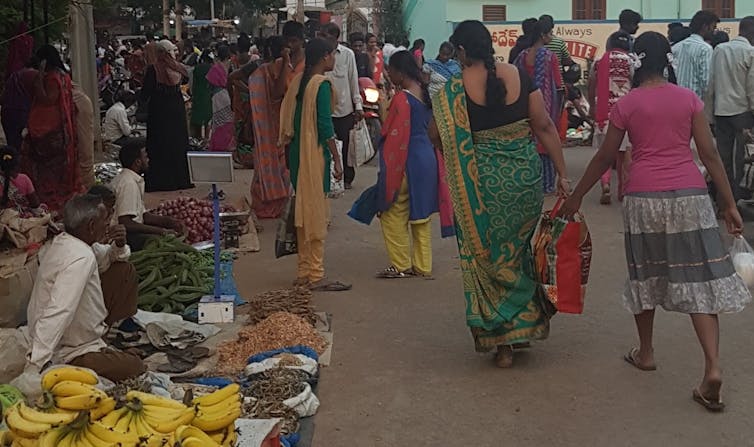Pauses in the busy lives of migrant Indian women can make a big difference
- Written by SriPallavi Nadimpalli, PhD Candidate, University of Melbourne
Women manage many overlapping responsibilities in both public and private spheres. Their busy routines leave them with just a little time to take a break or a pause in their activity. These pauses are a time for self or for activities other than home, work or care-giving responsibilities.
What is the role of such pauses in migrant women’s everyday lives? Interviews were conducted with 20 migrant women (mostly migrants from rural areas) in Hyderabad, India, and 19 Indian migrants in Melbourne, Australia, as part of doctoral research. From the interviews, these seemingly incidental pauses emerged as an integral part of their daily lives.
Read more: From lascars to skilled migrants: Indian diaspora in New Zealand and Australia
Each pause served a specific purpose and was itself as important as the women’s other routine activities. Pauses particularly helped the women strengthen their social ties in the community. Pauses also helped them get to know different (public) places.
Most of the participants were married women with children. They saw home and family as their primary responsibility. Some did paid work, or owned a small home-based business, while also managing domestic responsibilities.
What kind of pauses matter to these migrant women? It appears pauses in their busy routines were most important for:
social interactions
moments of self-reflection or relaxation
opportunities for work or other activities.
Social interactions
In India, we observed social interactions as pauses when the migrant women co-ordinated their chores or made trips in their neighbourhood. Washing and airing laundry or prepping meals while chatting together in the common corridors of apartment buildings was common during the day.
Socialising at the doorstep was convenient, accessible and easy to manage between chores. As Monica* explained:
Even if we are busy with work, we can step outside and rest for a bit […] Everyone can get back to their work after that!
 Corridor spaces provide places for co-ordinated daily chores and casual interactions.
Author provided
Corridor spaces provide places for co-ordinated daily chores and casual interactions.
Author provided
Trips on foot, to chaperone children to schools or to buy groceries, were similarly co-ordinated within small groups of women. Through these trips the migrant women identified others with similar cultural backgrounds and (migration) experiences and formed local connections.
Similarly, in Melbourne, women of similar ethnic or cultural backgrounds regularly co-ordinated lunch hours at work as time to “hang out” at a cafe or a restaurant. These acquaintances sometimes transformed into lasting friendships.
Self-reflection or relaxation
In India, the participants said their personal time was limited to only a short nap between chores when their spouse and children were away and if time permitted. In Melbourne, some used lunch hours at work for walks in the park, for both reflection and relaxation. Space for reflection helps cultivate self-awareness for any individual.
For Sejal*, this lunch hour was also an opportunity to spend quality time with her spouse during a brief period when they worked together in the CBD.
… because me and my husband never dated you know, (and) after one-and-a-half years (of marriage) I had a baby and that’s it … my life changed! […] So, I am spending it (that time) now … after 16 years of my marriage!
Opportunities for work and other activities
As women’s family responsibilities reduced at different life stages, some longer pauses appeared in their daily routines. For example in India, some women started a small home-based business like sewing or making handicrafts as their children got older. These activities were sometimes considered secondary, but provided a creative outlet and extra income for the family.
In Melbourne, some women felt they had lesser familial expectations than in their country of origin and they could pursue other interests. Nirmala* said that before migrating she had always felt the need to prioritise her children over her own needs.
‘Why do you want to study?’ they asked me, because I already have two children.
After her migration, Nirmala felt encouraged to study further, while continuing to be the primary carer at home.
Read more: Migrants who adapt to Australian culture say they're happier than those who don't
A break that builds bridges
Women’s everyday movements and activities have primarily emerged from gender norms shaped by patriarchy and societal expectations. Intervals of everyday casual interactions helped the women take a break from their “expected” responsibilities.
Pauses varied in duration and formats. They appeared in different spaces linked to the core routine activities of the women. These spaces ranged from home and its vicinity, to public spaces like streets and parks.
Read more: Putting the pieces together to create safe public spaces for all
These interactions helped the women identify others (mainly women) with similar interests or backgrounds. This helps them overcome unfamiliarity with a new place due to limited social connections. Social and cultural connections are particularly necessary for migrants to build a sense of belonging in their new cities.
 Interactions at a weekly informal market.
Author provided
Interactions at a weekly informal market.
Author provided
Further, through their individual and shared routines, the women identified familiar routes and “comfortable” places. For any individual, these routine and repetitive practices help develop an attachment to a place.
Read more: 'The neighbours were always very welcoming and warm': little things count to help refugees belong
The process of migration is a complex social phenomenon affecting the women’s health and vulnerability. In today’s “new normal” of restricted mobility and social distancing, what becomes of these pauses? What are the impacts on women as they face an increased burden of domestic responsibilities and vulnerabilities while everyone stays home?
And what will these turbulent times mean for the migrants who are already experiencing instability? Will these pauses take a different social and spatial form, or be forever lost?
* Names have been changed to protect anonymity.
Authors: SriPallavi Nadimpalli, PhD Candidate, University of Melbourne




